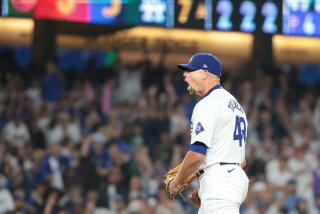Orioles Making Every Game Count
- Share via
CLEVELAND — In the amount of time it took for the Baltimore Orioles to amass three outs in the top of the first inning at Cleveland Stadium Wednesday night, the Kentucky Derby could have been run a dozen times.
You could have flown from Baltimore to Philadelphia. Roseanne Barr could have eaten the entire left side of the menu. Any menu. The 100-meter final at the Olympics could have been run 153 times.
There was enough time to watch every second of every Mike Tyson fight from the last three years. There was enough time for Michael Jordan to score 20 points, for Eric Dickerson to rush for 100 yards, for Greg Norman to birdie three holes and lose in a playoff. There might even have been enough time for Don King to get to the point, although he usually takes a little longer.
Before the top of the first was finished, Pete Rose could have auctioned off a good deal of his memorabilia collection to home shoppers. Liz Taylor could have been married and divorced -- twice. Gary Hart could have, well, never mind.
Jim and Tammy Bakker could have raised a million bucks and sold a half-dozen or so partnerships, easy -- back in the old days, of course, before this little “thing” cropped up.
Between the first pitch of the game, which Phil Bradley hit over the center fielder’s head, and the last of the 44 pitches thrown in the top of the first, the Orioles hit for 25 minutes.
Eleven batters came to the plate. There were six hits, three doubles, two walks and one double steal. The Cleveland Indians used two pitchers. The Orioles scored seven runs. The sun had not set. The Indians had not batted. The game was over. The Orioles would be in first place for another day.
When Stan Jefferson flied to left to end the inning, finally, the total went up on the scoreboard out beyond the center field bleachers. Seven. It made a powerful statement sitting there by itself, and, no doubt, when it went up on the scoreboards at the SkyDome in Toronto and Fenway Park in Boston, it had a similar impact.
Wednesday night’s game, see, passed as a fair test of these Orioles’ mettle. The night before, they had lost a game that Manager Frank Robinson called “a heartbreaker,” the Indians’ Brad Komminsk hitting a ninth-inning homer to win it. Toronto had moved to within a game of first, and the Indians had announced they were changing their rotation, moving in Greg Swindell, a left-hander with a 13-3 record and a 0.71 career earned run average against the Orioles, to start the next game.
With Toronto playing at home against the tepid Chicago White Sox, the Orioles knew they probably needed to win to maintain sole possession of first in the American League East, which has been their standing since May 26. Wednesday night’s game was the eighth the Orioles had played with their lead at one game or less. They had won six of the previous seven, and it took them 25 minutes Wednesday night to demonstrate again that they were up to the task.
The question was put to first baseman Randy Milligan: If you had closed to within one game of a first-place team you had been chasing for 96 days, and you saw on the scoreboard that they had scored seven runs in the top of the first, what would you think? “I would think that I better get on my horse,” Milligan said, smiling at the thought.
“The one constant I have noticed since I got here (on July 29),” said designated hitter Keith Moreland, who drove in the first two runs with a single, “is that every time we have had our backs to the wall, so to speak, we’ve come up with a big ball game. Seven runs in the top of the first, that’s a pretty good start.”
You might say. It was evident immediately that Swindell, who had been on the disabled list for a month with a sore elbow, was not his usual self. He was throwing hard but had little control. After Bradley doubled and Jefferson popped out, Cal Ripken walked. Then Bradley and Ripken pulled off a double steal, and Moreland singled them home. After Swindell walked Milligan, Mike Devereaux singled to load the bases. Bob Melvin then flied to center for the second out.
With Tim Hulett coming to bat, the game was at an early turning point. Either the Orioles would have a big inning, or Swindell would escape with only two runs on his ledger, giving him a chance to settle down. Hulett, who was at Rochester, N.Y., eight days ago, settled that score with a single that scored two runs. Out went Swindell, and Rene Gonzales met reliever Rod Nichols with a double that produced another run. Bradley followed with his second double of the inning, scoring two more.
One, two, three, four, five, six, seven. Jeff Ballard wound up having an easy time winning his 15th game, and, sure enough, Toronto wound up beating the White Sox. It means the Orioles will be right back in the same position Thursday night against the Indians, probably needing to win to remain alone in first place. Welcome to the pennant race.
“Sure, they’re aware in these games that they’re playing for first,” Robinson said. “I’m sure it makes a difference.”
Yes, and the issue, of course, is whether they can continue to play so well with first place at stake. If Toronto continues to win this regularly (10 of 12), it would seem inevitable that the Orioles have a bad game one of these nights and finally lose their hold on first. But then, the percentages of chance ceased to be relevant to this team months ago.
“If you give up first, you might not get it back,” Robinson said, and, at this point, after Wednesday night’s 7-0 start, who can say with any certainty that it is a problem the Orioles ever will face?
More to Read
Go beyond the scoreboard
Get the latest on L.A.'s teams in the daily Sports Report newsletter.
You may occasionally receive promotional content from the Los Angeles Times.










